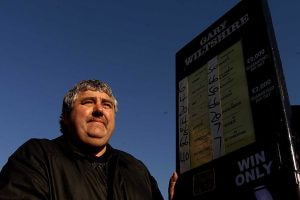England’s History in the Rugby World Cup Final
The 2023 Rugby World Cup in France gives England another chance to win the famous Webb Ellis Cup. Steve Borthwick’s team have been drawn in Pool D of the competition, alongside Japan, Argentina, Samoa and Chile. They are not rated amongst the favourites to win the tournament, following a disappointing fourth placed finish in the 2023 Six Nations, but the English have pedigree when it comes to the World Cup and have surprised before.

2023 Rugby World Cup Odds
Despite their past successes at the Rugby World Cup, England are only rated as the sixth favourites to win the tournament.
According to the latest Rugby World Cup betting odds, New Zealand lead the betting at 3/1, ahead of France at 10/3, the World Cup holders South Africa at 9/2, Six Nations champions Ireland at 5/1 and Australia at 14/1.
England are out at 16/1. That would see a fair reflection of the chances of Borthwick’s team, after winning just two of their five Six Nations fixtures. In August, England shared a win and a defeat in two matches against Wales, before losing World Cup warm-up games against Ireland and Fiji.
After England, it is Argentina that are ranked next in the betting at 28/1, with Scotland and Wales both at 50/1 and Fiji at 100/1. Get more betting tips in our Rugby World Cup betting preview.
With four appearances, no international team has made more Rugby World Cup finals than England, though it is fair to say that they have not been able to make the most of their opportunities. England have only won one of their four finals.
That compares to Australia winning twice from their four final appearances and New Zealand winning three of their four. South Africa have been victorious on all three occasions that they have reached the Rugby World Cup final, though if the English feel that they could have fared better, they only have to look towards France to see that things could be worse. The French have lost all three of the finals that they have reached.
These five nations are the only countries to have made the final of the tournament. We’re going to take a look at England’s chances of reaching it again and how the bookmakers rate their odds, but first it’s time to take a trip back down memory lane, by revisiting each of their final appearances.
1991 – Defeat On Home Soil
After the initial World Cup was co-hosted by Australia and New Zealand in 1987, the tournament came to Europe four years later. The then Five Nations competitors, comprising of England, France, Ireland, Scotland and Wales, were on hosting duties, with the final to be played at Twickenham.
England would play all of their pool games at Twickers, including their tough opener against the reigning champions New Zealand, which they lost 18-12. Geoff Cooke’s team bounced back with comprehensive wins over Italy and USA.
After reaching the knockout stage, England entered the lion’s den – twice. In the quarter-finals they faced France in Paris, coming away with a 19-10 win. In the semis they met Scotland at Murrayfield, edging a 9-6 victory.
Back at Twickenham, they would meet Australia in the final. Yet the criticism of Cooke’s attritional style of play, saw a switch to a more expansive and open game, which the Wallabies took advantage of. Australia were 9-0 ahead at half-time and though England came back stronger after the break, they ultimately lost 12-6.
2003 – Victory Down Under
With the 2003 Rugby World Cup being held in Australia, the English had the perfect chance to take revenge, following that 1991 defeat. England had won the Six Nations earlier in 2003, which was the third time in four years that they had been crowned as kings of Europe, under the leadership of Clive Woodward.
They didn’t disappoint in the pool stage, winning all four of their games. This included a 25-6 win over South Africa, along with victories over Samoa, Uruguay and Georgia.
In the quarter-finals, England faced familiar foes Wales in Brisbane. They would win 28-17, setting up a semi-final with France in Sydney. The trusty boot of Jonny Wilkinson provided England with each and every point of their 24-7 victory, which saw them reach their second Rugby World Cup final.
Australia were waiting and England not only took revenge, but did so in the most dramatic manner possible, inflicting true sporting heartbreak upon the hosts. At half-time, it looked like it could be an easy victory for Woodward’s men, as they went into the break with a 14-5 lead. Yet England would fail to register another point in the second-half and Australia brought the scores level at 14-14. In extra time, the teams were tied at 17-17 and heading for a penalty shootout, with just 28 seconds left on the clock. That was when the ball left Wilkinson’s lesser-used left-foot, for a drop goal from 30m out. Wilkinson and England had won the World Cup, by a 20-17 scoreline.
2007 – England Lose Their Crown
In 2007, England were the defending Rugby World Cup holders in France. By this stage Woodward had departed and been replaced by Brian Ashton as head coach, but the squad was still packed with World Cup winners, including Wilkinson.
Yet the signs were there that England would not be so reliable, during the pool stage. Though England progressed in second place with three wins from four games, they were soundly beaten 36-0 by South Africa.
In the quarter-finals, England met Australia in Marseille and once again it was Wilkinson breaking Wallaby hearts, as he converted four penalties to secure a 12-10 win. Then came a semi with the hosts France in Paris. A try from Josh Lewsey and more accurate kicking from Wilkinson, saw England reach another final with a 14-9 win.
The final saw England have the chance to avenge that pool stage defeat by South Africa. Wilkinson had not played in that match, but his presence did not change the result, even if the scoreline was much closer. Within six minutes, South Africa took the lead. Finding themselves 9-3 up by half-time, they closed the match with a 15-6 victory.
2019 – South Africa Go Big In Japan
The most recent Rugby World Cup in 2019, saw the action move to Asia for the first time, with Japan as hosts. England were rated as third favourites, despite Wales having pipped them to the Six Nations earlier that year.
In Pool C, England would beat Tonga, USA and Argentina, to set up a final match with France to determine who would win go into the knockout stage as pool winners. A typhoon would see the scheduled match in Yokohama cancelled and the teams were awarded a 0-0 draw.
It was England that won the pool, which saw them face Australia in the quarter-finals. With the Australian Eddie Jones as head coach, England thrashed their rivals 40-16. Another Southern Hemisphere giant were waiting in the semis in the shape of New Zealand, with England triumphing 19-7.
That win gave England their second Rugby World final against South Africa. The English were favourites after their wins over Australia and New Zealand, but the Spingboks were made of sterner stuff. South Africa took advantage of England’s handling errors to lead 12-6 at half-time and then ran riot in the second-half, to clinch a 32-12 victory.
England’s Chances
For most rugby betting fans, under normal circumstances England would be extremely confident about winning Pool D, where they are up against Japan, Argentina, Samoa and Chile. Their shock loss against Fiji and overall poor form, means that they cannot be complacent.
If they win Pool D, they will meet the runner-up from Pool C, which is likely to be either Australia or Wales. A second place finish would see them face the winner of Pool C.
With Australia having lost their last five games and Wales being in erratic form, there’s no reason why England couldn’t make the semi-finals, which can be backed at 4/6.
Making it to another final, would seem a step too far. Whichever path they go down they are likely to have one of France, Ireland, New Zealand or South Africa waiting for them. All of which would be considered favourites to beat England.
The beauty of sport is that you never know what will happen and England’s pedigree suggests they have a puncher’s chance. Under the circumstances, a group exit could be considered a disaster, while a quarter-final loss would be no surprise. A semi-final appearance would considered a success and a fifth final, an unlikely miracle.



